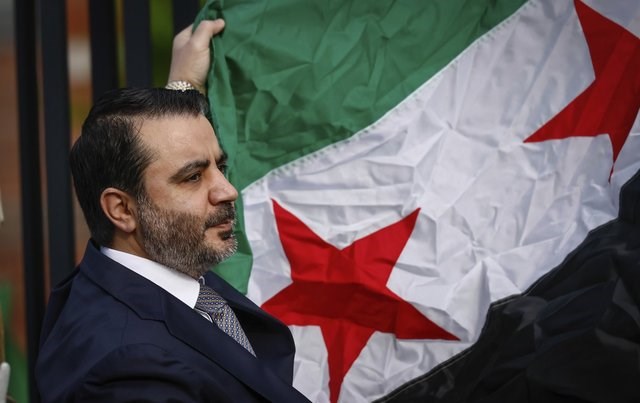
Syria's Foreign Minister Asaad Al-Shibani holds the Syrian Flag during a ceremony where the Syrian flag was added to the 100 flags flying in line at United Nations Headquarters on Friday, April 25, 2025. (AP Photo/Kena Betancur)
Republished April 25, 2025 - 9:21 AM
Original Publication Date April 25, 2025 - 1:36 AM
UNITED NATIONS (AP) — Syria's foreign minister attended a U.N. Security Council briefing Friday after raising his country’s new flag at the international body's headquarters. It was the first public appearance by a high-ranking Syrian government official in the United States since the fall of President Bashar Assad in a lightning rebel offensive in December.
Asaad al-Shibani is in a delegation of authorities from Damascus' new government who have traveled to the United States this week in hopes of receiving relief from harsh sanctions that were imposed by America and its allies after Assad’s brutal crackdown on anti-government protests in 2011 that spiraled into a civil war.
“We are open to the international community and look forward to being treated the same way,” al-Shibani said, as reported by state-run news agency SANA. “With the removal of the reason for the sanctions, they must be lifted.”
Marking the arrival of a new Syria
The presence of a new Syria was in evidence outside the U.N. headquarters as al-Shibani watched the three-starred flag previously used by opposition groups replace the two-starred flag of the Assad era as the country's official emblem. Members of the Security Council, the U.N.’s most powerful body, welcomed the new interim minister shortly after, saying his attendance is a “positive step" toward a more prosperous Syria.
But many countries and U.N. officials warned there is still much more work to be done.
“Syria has moved beyond a caretaker government to a new, expanded, and more diverse cabinet,” Geir Pedersen, the U.N. special envoy for Syria, told the council. " This is an improvement from what went before. Yet it is still not a fully inclusive framework for political transition. And this leaves many Syrians unsure of their place in the emerging new Syria.”
Other Syrian officials attended meetings at the World Bank and the International Monetary Fund this week in Washington, but it was unclear if Trump administration officials would meet al-Shibani during the visit.
“The United States continues to closely monitor the actions of the Syrian interim authorities,” Dorothy Shea, the deputy U.S. ambassador to the United Nations, said in her remarks. “We remain hopeful that the interim cabinet announced by the interim authorities at the end of March represents a positive step.”
But, she added, the U.S. expects “to see additional action and the appointment of more qualified and representative individuals to serve in critical positions.”
The US hasn't recognized the new government yet
President Donald Trump's administration has yet to officially recognize the current Syrian government of Ahmad al-Sharaa, an Islamist former insurgent who led the offensive that toppled Assad. The Republican administration has also left the Assad-era sanctions in place, although it has provided temporary relief to some restrictions. The militant group that al-Sharaa led, Hayat Tahrir al-Sham, remains a U.S.-designated terrorist organization.
Two Republican members of the U.S. Congress, Reps. Marlin Stutzman of Indiana and Cory Mills of Florida, arrived in Damascus last week on an unofficial visit organized by a Syrian-American nonprofit group and met with al-Sharaa and other government officials.
Mills told The Associated Press before meeting with al-Sharaa that “ultimately, it’s going to be the president’s decision” to lift sanctions or not, although he said that “Congress can advise.”
Mills later told Bloomberg News that he had discussed the U.S. conditions for sanctions relief with al-Sharaa, including ensuring the destruction of chemical weapons left over from the Assad era, coordinating on counterterrorism, making a plan to deal with foreign militants who fought alongside the armed opposition to Assad, and providing assurances to Israel that Syria wouldn't pose a threat.
He also said that al-Sharaa had said that Syria could normalize relations with Israel “under the right conditions,” without specifying what those conditions are.
Other Western countries have warmed up to the new Syrian authorities more quickly. The U.K. government on Thursday lifted sanctions against a dozen Syrian entities, including government departments and media outlets, and the European Union has begun to roll back its sanctions.
___
Sewell reported from Beirut.
News from © The Associated Press, 2025